The day I arrived in New York to help deal with my father’s medical emergency, they were repairing the sewer pipe under my parents’ house.
The onslaught of noise was deafening as workers cut through an entire square of concrete then lowered themselves into the cavernous maze of underground pipes to search for the blockage. It took them two days to find the troubled spot, which had already plagued my parents for a week: no showers, no laundry, minimal dishwashing, and a directive to flush the toilet only when absolutely necessary. And after all that noise and digging, the blockage turned out to be not in the area where they’d dug at all. They found the problem in the sad little brick-enclosed square of dirt my parents call the “front yard”–under a rosebush that had already been reduced to small rootball and a few aspiring fronds.
The next day, when my father was officially referred to hospice and people rained all that “death is a passage” stuff on us, I thought about that sewer pipe–also a passage. And I also thought about the Dylan Thomas villanelle and its repeating haunting lines: Do not go gentle into that good night … Rage, rage against the dying of the light.
It isn’t that I want my father to fight against the reality of his dying. I feel grateful that he is not–and has never been–an angry or vengeful person. Even in his compromised state, while depressed about what is happening, he continues to exude kindness and express love and gratitude to those around him.
But I feel like raging. Not at the inevitability of my father’s death, but at the sadness of seeing him so frail and unable to do things for himself–the “dying” of my image of my 90+ year-old parents as timeless icons of longevity.
And I feel myself raging against the barely flickering “light” of my country. Yet this rage feels like a fruitless kick-the-floor-and-flail-my-arms temper tantrum. Pundits tell us to keep breathing and find joy. The sun is brilliant on the half-inch of freshly fallen snow today. But where is the balance between digging and doing what we can and totally abandoning ship, closing our doors and taking out whatever might constitute our modern-day “opium pipe” to lose ourselves in a stupor of disempowerment and apathy.
I’m forever grateful to Bishop Marianne Edgar Budde, who was able to channel her rage into a calm and quiet plea for mercy, focusing the whole time she spoke, toward whatever light might be left that’s still shining on who we could be–individually and collectively. And I’m wondering if that’s the kind of light that flashes before our eyes as we near the end of our lives in addition to reliving all of our life’s significant moments. I’m wondering what my father, an Emmy Award-winning journalist, is thinking as he sits hooked up to his oxygen machine with the New York Times spread on his lap, trying to stay awake long enough to get through more than a paragraph and make sense of all that’s happening around him.
Rage, rage, against the dying of the light.
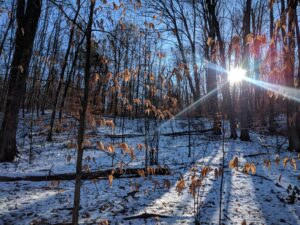
While we all have to accept death, as hard as it is, we mustn’t go gentle into this dark time, or accept the numerous attacks on our Constitution as the legitimate prerogative of a new leader. I feel grateful for the many in our community who are joining together and channeling their quiet rage into action. Death may be a lonely endeavor, but raging can be a community enterprise. I’m grateful to the many who are standing up to support immigrants, transgender people, the environment, and the many other important issues that are under attack.
In fact, what keeps me finding joy is knowing I have community–both to support me during this difficult personal time and to work together on keeping the light shining.
Subscribe at https://ddinafriedman.substack.com


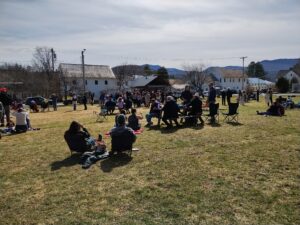 Things seemed pleasantly normal in the hour before the big event. People donned eclipse glasses to sneak views of the disappearing sun, children ran through the grass playing, and adults waited in lines for free pizza cooked in the community stone oven or to silk-screen a t-shirt as an Eclipse Day souvenir.
Things seemed pleasantly normal in the hour before the big event. People donned eclipse glasses to sneak views of the disappearing sun, children ran through the grass playing, and adults waited in lines for free pizza cooked in the community stone oven or to silk-screen a t-shirt as an Eclipse Day souvenir. 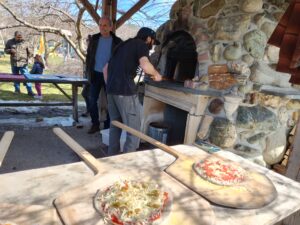 But when totality hit, something shifted in the energy. There was a hush among the crowd, a kind of collective “wow.” My eclipse glasses now dark, I was nervous about viewing the corona with unprotected eyes, but there it was, eerie and other-worldly, the tiny ring of light flaring in asymmetrical bursts before settling to a steady glow like a small spark of hope.
But when totality hit, something shifted in the energy. There was a hush among the crowd, a kind of collective “wow.” My eclipse glasses now dark, I was nervous about viewing the corona with unprotected eyes, but there it was, eerie and other-worldly, the tiny ring of light flaring in asymmetrical bursts before settling to a steady glow like a small spark of hope.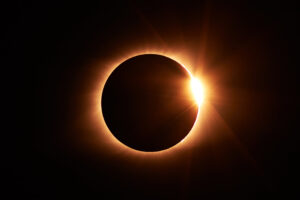
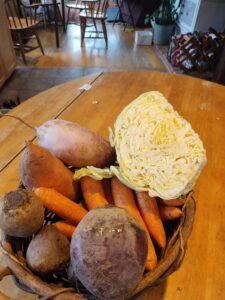
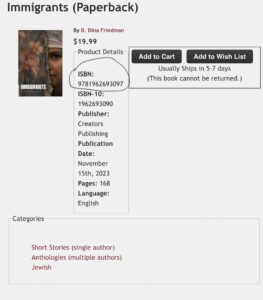 and that didn’t happen until six weeks after the book was published. In the meantime, I was grateful to the bookstores who were willing to take copies of
and that didn’t happen until six weeks after the book was published. In the meantime, I was grateful to the bookstores who were willing to take copies of